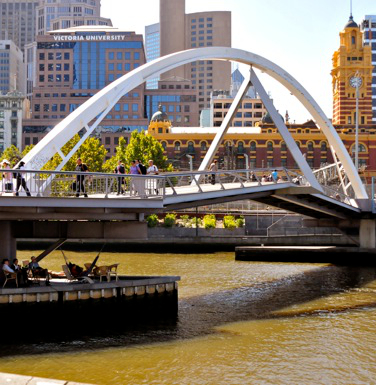Self-assured city has no love for its stream
 Metropolitan living is taking a toll on the residents of Melbourne’s Yarra River.
Metropolitan living is taking a toll on the residents of Melbourne’s Yarra River.
A new study shows that while it may be the world’s most liveable city for humans, Melbourne is much less hospitable to anything living in its central river, other than E.Coli.
Research from the Centre for Aquatic Pollution Identification and Management (CAPIM) has found that mud in the Yarra Estuary contains high levels of arsenic, chromium, nickel, zinc and lead.
Earlier checks found levels of E.coli bacteria more than 21 times higher than is considered safe for rowing, in the Yarra Catchments. The river has long been considered too laden with E.Coli to swim in.
“By world standards, the concentrations of zinc present in sediments are high, whereas other heavy metals such as cadmium and mercury are low,” CAPIM chief executive Dr Vincent Pettigrove has told News Corp reporters.
“A lot of pollution comes from our homes. We often forget that whatever goes down a stormwater drain ends up in our rivers.
“Unless we can manage this growth and ensure proper treatment of urban run-off, the health of the Yarra will deteriorate,” Dr Pettigrove said.
“To reduce pollution, two things should be done; regulate that all new developments adopt Water Sensitive Urban Design so less stormwater flows into waterways,” said Yarra Riverkeepers president Ian Penrose.
“[And] publish water quality information openly and frequently, so that the community can properly understand the problem and support solutions.”
Melbourne’s Lord Mayor Robert Doyle told reporters that there are “16 agencies and about 21 pieces of legislation governing the Yarra.”
“We’re not serious about managing the Yarra. Simple as that,” he said, calling for change.
Parks Victoria, Department of Environment and Primary Industries, Transport Safety Victoria, Department of Transport, Planning and Local Infrastructure, Environment Protection Authority, Port of Melbourne Corporation, Melbourne Water and City of Melbourne all have a stake in river management, which is operated by separate groups including the Melbourne Waterfront Forum, Melbourne waterfront plan and Melbourne waterfront co-ordination committee
“For every good idea, there’s a thousand regulatory objections, and that’s just hopeless. No wonder we turned our back on the river for so long. It is just too hard,” the Lord Mayor said.








 Print
Print